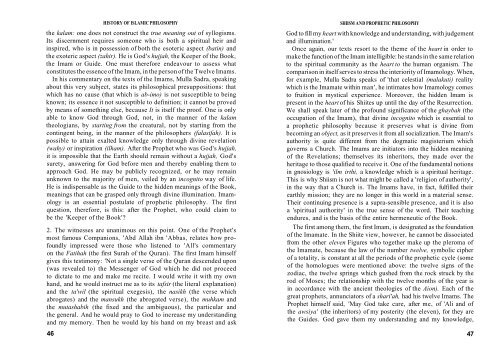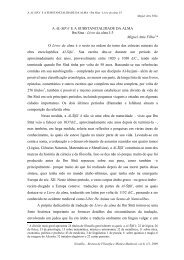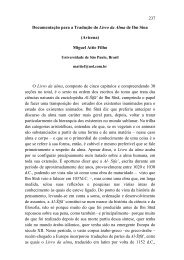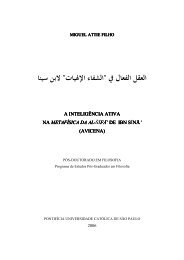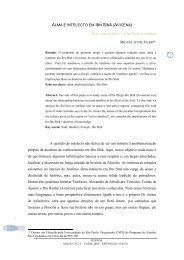History Of Islamic Philosophy - Henry Corbin.pdf - Falsafa
History Of Islamic Philosophy - Henry Corbin.pdf - Falsafa
History Of Islamic Philosophy - Henry Corbin.pdf - Falsafa
Create successful ePaper yourself
Turn your PDF publications into a flip-book with our unique Google optimized e-Paper software.
HISTORY OF ISLAMIC PHILOSOPHY<br />
the kalam: one does not construct the true meaning out of syllogisms.<br />
Its discernment requires someone who is both a spiritual heir and<br />
inspired, who is in possession of both the esoteric aspect (batin) and<br />
the exoteric aspect (zahir). He is God's hujjah, the Keeper of the Book,<br />
the Imam or Guide. One must therefore endeavour to assess what<br />
constitutes the essence of the Imam, in the person of the Twelve Imams.<br />
In his commentary on the texts of the Imams, Mulla Sadra, speaking<br />
about this very subject, states its philosophical presuppositions: that<br />
which has no cause (that which is ab-imo) is not susceptible to being<br />
known; its essence it not susceptible to definition; it cannot be proved<br />
by means of something else, because It is itself the proof. One is only<br />
able to know God through God, not, in the manner of the kalam<br />
theologians, by starting from the creatural, not by starting from the<br />
contingent being, in the manner of the philosophers (falasifah). It is<br />
possible to attain exalted knowledge only through divine revelation<br />
(wahy) or inspiration (ilham). After the Prophet who was God's hujjah,<br />
it is impossible that the Earth should remain without a hujjah, God's<br />
surety, answering for God before men and thereby enabling them to<br />
approach God. He may be publicly recognized, or he may remain<br />
unknown to the majority of men, veiled by an incognito way of life.<br />
He is indispensable as the Guide to the hidden meanings of the Book,<br />
meanings that can be grasped only through divine illumination. Imamology<br />
is an essential postulate of prophetic philosophy. The first<br />
question, therefore, is this: after the Prophet, who could claim to<br />
be the 'Keeper of the Book'?<br />
2. The witnesses are unanimous on this point. One of the Prophet's<br />
most famous Companions, 'Abd Allah ibn 'Abbas, relates how profoundly<br />
impressed were those who listened to 'All's commentary<br />
on the Fatihah (the first Surah of the Quran). The first Imam himself<br />
gives this testimony: 'Not a single verse of the Quran descended upon<br />
(was revealed to) the Messenger of God which he did not proceed<br />
to dictate to me and make me recite. I would write it with my own<br />
hand, and he would instruct me as to its tafsir (the literal explanation)<br />
and the ta'wil (the spiritual exegesis), the nasikh (the verse which<br />
abrogates) and the mansukh (the abrogated verse), the muhkam and<br />
the mutashabih (the fixed and the ambiguous), the particular and<br />
the general. And he would pray to God to increase my understanding<br />
and my memory. Then he would lay his hand on my breast and ask<br />
46<br />
SHIISM AND PROPHETIC PHILOSOPHY<br />
God to fill my heart with knowledge and understanding, with judgement<br />
and illumination.'<br />
Once again, our texts resort to the theme of the heart in order to<br />
make the function of the Imam intelligible: he stands in the same relation<br />
to the spiritual community as the heart to the human organism. The<br />
comparison in itself serves to stress the interiority of Imamology. When,<br />
for example, Mulla Sadra speaks of 'that celestial (malakuti) reality<br />
which is the Imamate within man', he intimates how Imamology comes<br />
to fruition in mystical experience. Moreover, the hidden Imam is<br />
present in the heart of his Shiites up until the day of the Resurrection.<br />
We shall speak later of the profound significance of the ghaybah (the<br />
occupation of the Imam), that divine incognito which is essential to<br />
a prophetic philosophy because it preserves what is divine from<br />
becoming an object, as it preserves it from all socialization. The Imam's<br />
authority is quite different from the dogmatic magisterium which<br />
governs a Church. The Imams are initiators into the hidden meaning<br />
of the Revelations; themselves its inheritors, they made over the<br />
heritage to those qualified to receive it. One of the fundamental notions<br />
in gnosiology is 'ilm irthi, a knowledge which is a spiritual heritage.<br />
This is why Shiism is not what might be called a 'religion of authority',<br />
in the way that a Church is. The Imams have, in fact, fulfilled their<br />
earthly mission; they are no longer in this world in a material sense.<br />
Their continuing presence is a supra-sensible presence, and it is also<br />
a 'spiritual authority' in the true sense of the word. Their teaching<br />
endures, and is the basis of the entire hermeneutic of the Book.<br />
The first among them, the first Imam, is designated as the foundation<br />
of the Imamate. In the Shiite view, however, he cannot be dissociated<br />
from the other eleven Figures who together make up the pleroma of<br />
the Imamate, because the law of the number twelve, symbolic cipher<br />
of a totality, is constant at all the periods of the prophetic cycle (some<br />
of the homologues were mentioned above: the twelve signs of the<br />
zodiac, the twelve springs which gushed from the rock struck by the<br />
rod of Moses; the relationship with the twelve months of the year is<br />
in accordance with the ancient theologies of the Aion). Each of the<br />
great prophets, annunciators of a shari'ah, had his twelve Imams. The<br />
Prophet himself said, 'May God take care, after me, of 'Ali and of<br />
the awsiya' (the inheritors) of my posterity (the eleven), for they are<br />
the Guides. God gave them my understanding and my knowledge,<br />
47


